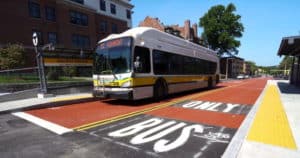The MBTA appears to be on track to start the next fiscal year with staffing levels 20 to 25 percent below what’s required to maintain the system and needs to hire 2,800 workers in the next 12 months to ensure safety and progress, according to a new report, which raises questions about how long staffing-related service reductions will remain in place.
Gov. Maura Healey promised to hire an additional 1,000 transit workers before the end of 2023, and recently proposed $20 million toward the effort with other funds for MBTA hiring coming from the money lawmakers and former Gov. Charlie Baker steered to the T last year.
Her hand-picked MBTA General Manager Phillip Eng takes over the fraught system next week, and has said he is committed to “ramping up hiring to ensure that we have the workforce in place to deliver the reliable service that riders deserve.”
Factoring in current workforce numbers, vacancies and expected departures, the new Massachusetts Taxpayers Foundation analysis says the 2,800 hires the group is recommending would just meet current needs.
The T’s fiscal 2023 operating budget staffing plan called for hiring 1,759 new staff, increasing the MBTA’s operations headcount by a net 1,091 after accounting for backfilling vacancies. As of March, the MBTA headcount stood at an increase of about 170 this fiscal year, the MTF report says.
“While the MBTA has made progress in its hiring processes with a gain of about 170 in its operating headcount in FY 2023, increased separations from retirements, competitors, and the effects of COVID have forced the T to operate with 14 percent of budgeted positions vacant. As troubling as that sounds, the MBTA could start the new fiscal year with staffing levels of 20 to 25 percent below what’s required to maintain and operate the core system,” MTF said.
In its fiscal 2024 operating budget, the MBTA board proposed funding for about 7,600 workers – a 30 percent increase over current staffing, said MTF vice president for policy and research Andy Bagley, who wrote the report. New workers would backfill 1,088 current vacancies, address safety concerns that the Federal Transit Authority directed the T to fix, add staffing for the MBTA’s bus network, operate the new Green Line Extension and implement its fare transformation program.
Short 1,800 workers of what it needs, with 1,100 vacant positions to fill and 600 fewer bus operators than the average of the previous four years, Bagley said the T faces a “stunning” labor shortage, in a time when hiring has become a challenge statewide.
“It’s a stunning gap to see what they think they need to adhere to the FTA directives and to fully operate and maintain the current system, vs. where they are in a virtually impossible labor market,” Bagley said.




 |
| 


